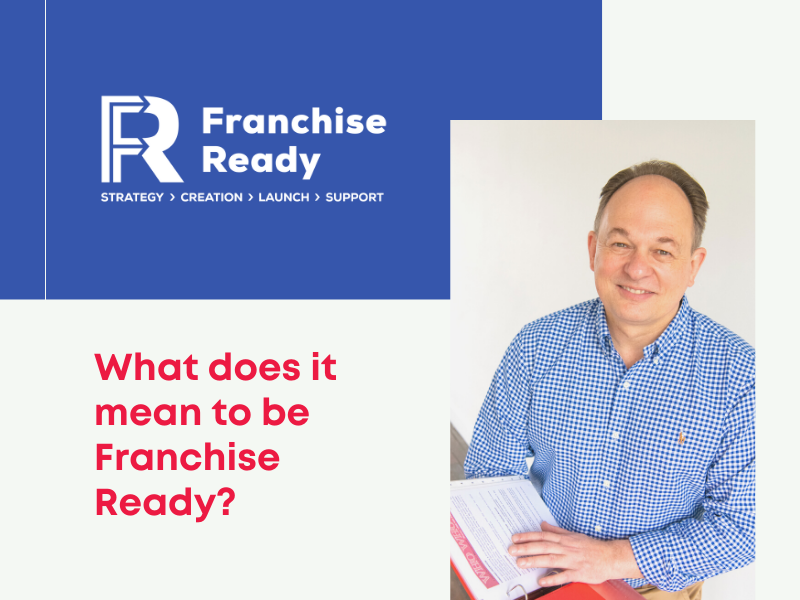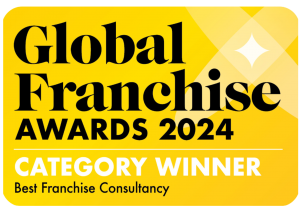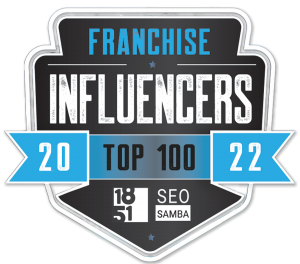Being Franchise Ready is relevant whether you’re considering franchising your own business or becoming a franchisee of someone else’s franchise network.
Every business should be franchise ready. Not every business should or will become a franchise, but every business should be ready to franchise. This forces a business owner to systemise and remove the dependency on themselves, which enables their business to grow exponentially.
There’s proof that systemised businesses, with documented processes, and that operate successfully regardless of whether the owner is in the business every day, sell for a much greater value. While business valuation is important, it is just as crucial that the business owner can remove themselves from doing ‘everything’ in the business.
Business owners go into business for a range of reasons: to be their own boss, to perfect their craft, to create a legacy, to hopefully have more money than they would make as an employee, to provide for their family, and for the pride of creating their own business and destiny. But the one reason we hear most is, to have freedom and quality of life.
If you speak to 99% of business owners, they will tell you that particularly in the early stages of a business’s growth, they were or are the hardest working and lowest paid employees in their business. This is true for the emerging franchisor but made slightly easier for the prospective franchisee, as the franchisor will have perfected the business model which enables the franchisee to scale quicker as they don’t have to develop anything, the groundwork has been done for them already.
Joining a franchise business makes it easier for people to start and grow a business, we know that the business success rate globally is less than 50% after 5 years but in franchising the success rate is as high as 80% over the same period.
The Top 5 Things to consider if you’re thinking about Franchising
1. BUSINESS RISK
2. PRODUCTS AND SERVICES
3. THE BUSINESS MODEL
4. FRANCHISEE PROFITABILITY
5. FRANCHISOR PROFITABILITY
1. Business Risk: There is an inherent risk with going into business and potential franchisees and franchisors need to be aware of the associated risk. I believe there are ‘risk-seekers’ and ‘risk-tolerators’. All business owners are risk takers, and while you must be, the key is the calculated risk.
Some business owners are more comfortable with risk.
Risk-seekers derive excitement from uncertainty. Have you ever driven your car around on empty when you could have just as easily filled up earlier? Do you ever schedule that extra meeting, when in reality there is no possible way, you can fit it in? Heaven forbid you might have even run late for a flight or missed one completely, or dare I say it, been late for a meeting.
There’s a strong chance that if you’re a risk-seeker, you like the adrenaline rush. You’ve probably driven too fast, bungee jumped, skydived, been around wild animals, or partaken in other adrenaline junkie type activity.
Risk-seekers are impatient and like doing multiple things because they can get a bit bored with too much detail, they make decisions quickly.
Risk-tolerators do not necessarily see it as risk. They pursue their goals by understanding, accepting, managing the inherent risks of the decisions that they make.
The risk tolerant business owner spends more time analysing, understanding, and assessing the risks at hand, learning how best to mitigate them. These risk-tolerant individuals confront fear not with the risk-seeker’s optimism, but with thoughtful analysis, management, and self-awareness techniques.
Anyone considering going into business needs to assess the risk, the beauty of franchising is that the risk is mitigated to some degree by the development of the business and business model
2. Products & Services: The quality and relevance of the products & services is critical there must be demand and a proven track record of customer need and then want for the products or services
There are four stages in the product life cycle. The introductory, growth, maturity, and decline phase. There are advantages associated with each stage in the life cycle and strategies to position the business for growth through franchising. The franchisee and franchisor need to do the requisite research of the market to determine the market need before investing.
Ultimately their needs to be strong demand for the products or services that the franchise offers and that there is a strong enough point of differentiation.
3. The Business Model: The key factor any aspiring franchisor needs to consider is that franchising their business is not an extension of their existing business, it is a totally new business. Franchising a business impacts the costs and revenue of the new business model, NOT their existing business model. Franchisees may incur more costs due to royalties, training, or build-out requirements; they should experience higher revenue due to name recognition and enjoy larger margins due to purchasing power.
Whilst the products and services remain at the core of the operation, the way that they are delivered to the market is very different when utilising franchising to grow a business.
As a franchisor you will have three distinct target markets or businesses:
(1) recruiting franchisees
(2) supporting franchisees
(3) providing services to customers.
The important aspect for the franchisee in assessing the business model is the simplicity to replicate and the documented model for ensuring a consistent delivery of the products and services, ultimately it is about ensuring that the business (model) has a proven method for attracting customers and delivering the products and services in a cost-effective way for the franchisee and the end user (the customer).
4. Franchisee Profitability: People go into business to make money and get a fair return on their investment; the two key investments people make are time and money and both are important.
Often people think being a business owner will give them greater control over their life and flexibility
with their work hours and this does happen once the business is established but early on the prospective franchisee and franchisor will work tirelessly to get their business going, so the franchisee needs to understand what this may mean to them and their desired lifestyle, if the business trades 7 days a week and is open long hours, they need to consider the impact that this may have on them. Choosing a business that suits your lifestyle if critical, but it is important to understand that in the early stages of the business, you will work long and hard.
The financial return on a business investment is and should be a key consideration of both the franchisee and the franchisor. The franchisor needs the franchisee to be profitable to grow their franchise brand and to have happy franchisees and the franchisee needs to get a fair return on their investment of time and money.
On average service-based franchises see a Return on Investment (ROI) in 1-2 years and for a retail or hospitality business a Return on Investment (ROI) in 2-3 years. The better franchise systems will provide you a sophisticated financial modelling tool to enable you to evaluate the potential ROI but it is important to know the success of the business is contingent on the franchisee and their ability to utilise the business model effectively. A good franchise business will sell for 2-3 times profit when the franchisee decides to sell, and this compares well with independent businesses that often sell for between 1-2 times profit.
5. Franchisor Profitability: Just as important as franchise profitability, the franchisor needs to develop a business model that ensures their profitability so that they can reinvest back into the growth of their business, most franchisors will not make a lot of money in the first couple of years as they will be reinvesting back into the growth of their brand, being a franchisor is a longer term proposition than being a franchisee but the benefits can be substantial with business valuation ranging from 5-15 times profit.
The business model needs to be well developed to ensure simplicity of operations through a well-documented system and suite of tools, a product or service that is in demand and proven, and that will yield a fair return for the franchisee and franchisor.
Franchise Ready works with all its clients to ensure that this achieved to ensure the long-term success for both franchisees and franchisors, without that the business won’t work.









